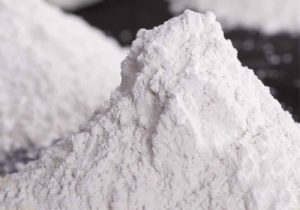
CP-992 Organophilic clay
CP-992 Organophilic Clay, the wet process improved viscosifier and gelling agent . It is a rapidly dispersing.
Gelling agent for cosmetics, This is a raw material commonly used by many cosmetic companies at present. It is mainly used in nail polish. As an organoclay bentonite, it plays an effective thickening effect when added to cosmetics. Our CP-27 has been used by a large number of customers in the market. If you happen to p

CP-992 Organophilic Clay, the wet process improved viscosifier and gelling agent . It is a rapidly dispersing.

CP-982 Organophilic Clay is an amine treated bentonite with a moderate temperature performance.

CP-150 Organophilic Clay is a self-activating organoclay that disperses easily and performs well in diesel, low aromatic mineral oil, modified vegetable oil, and synthetic base fluid formulations.


CP-10 organoclay is a rheological additive made of organoclay. It is used in non-polar to moderately polar aliphatic and other solvent systems

CP-MPZ organoclays is an modified bentonite that is used in solvent and resin systems ranging from non-polar to highly polar.

The CP-MPS rheology modifier is a type of organo clay rheological additive that is used in solvent and resin systems ranging from non-polar to high polarity.
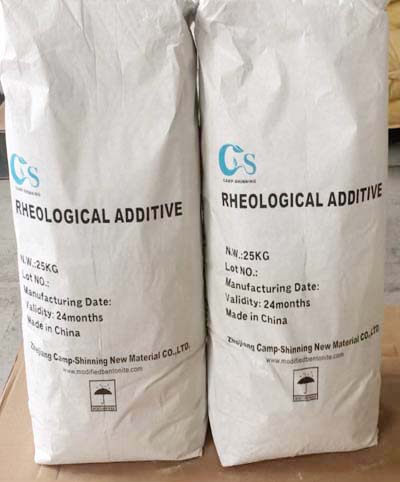
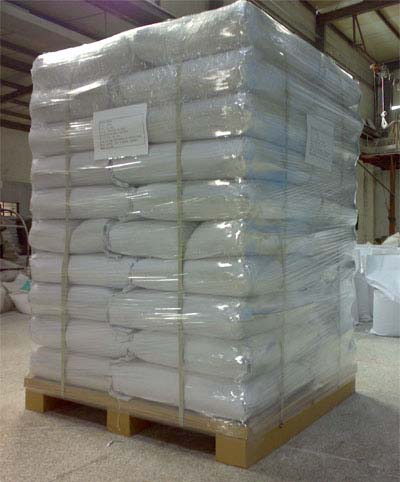
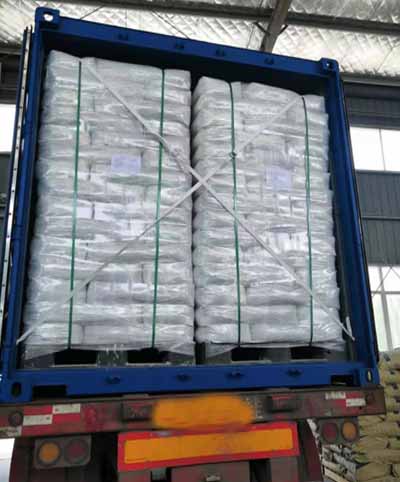
Organoclay Supplier / Manufacturer :
Internet address: https://www.rheologymodifiers.com/
Email address: [email protected]
Whatsapp / Wechat: +86-13185071071
Organophilic Clay Supplier / Manufacturer :

CP-EW Organoclay for Water Based paint. It is primarily employed in water borne paint systems,such as latex paint. So it is a good water based additive in paints,coatings,grease etc.

CP-EWS Modified bentonite It is employed in a water-borne coatings system. CP-EWS organoclay outperforms CP-EW in terms of thixotropy, transparence, and dispersion.

CP-WBS Rheology Modifier is rheological modified bentonite. It is mostly employed in water-borne systems.


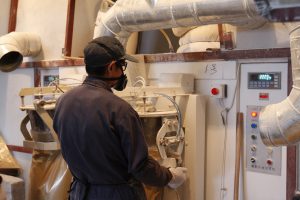
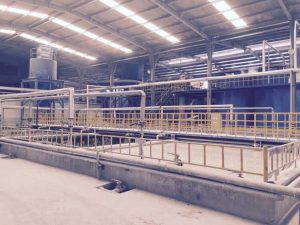

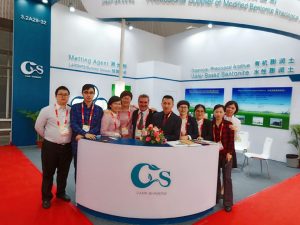
The Organoclay bentonite | Organophilic clay -specialized Zhejiang Camp-Shinning New Material CO.,LTD. and Hangzhou Camp-Shinning CO.,LTD. are subsidiaries of Camp-Shinning.
Camp-shinning concentrated on high value-added, high-technology organo bentonite series products, particularly in research, development, manufacturing, and sales of organic (solvent based organoclay) and inorganic bentonite (water based organoclay).
Our Organophilic bentonite clay finds widespread application in oil drilling mud, paint, coating, lubricating grease, adhesive, construction mortar, cosmetics, and waste water treatment, among other applications. A group of world-class professional users and distributors, such as SUN CHEMICAL,,SIEGWERK,LEHMANN &VOsS, and others, have acknowledged our dependable quality.
Current annual production of organic bentonite clay | organoclay is 20,000 metric tons, while refined bentonite production is 15,000 metric tons.
Our ISO 9001 quality system certification and IS014001 environmental management system certification, as well as our own mine with superior ore quality and production of proprietary technology, ensure the long-term quality and supply stability of our Organoclay bentonite | Organophilic clay.
Our mission is to provide users with superior Organoclay bentonite | Organophilic clay and services and to collaborate with them to achieve success and glory.
Internet address: https://www.rheologymodifiers.com/ and email address: [email protected]
Whatsapp / Wechat: +86-13185071071
Organoclay | Organophilic Clay CP-2 also named amine treated Bentonite.
In diesel oil based fluids,organophilic clay viscosifier CP-2 are used to increase carrying capacity and suspension properties, providing support for weight materials and improved cutting removal. Organophilic bentonite also aids in filter-cake formation and filtration control.
Properties
Composition Organically modified bentonite clay
Physical appearance Off white to tan free-flowing powder
Moisture content (105℃,2hr) ≤4%
Particle size (<76μm or 200mesh) ≥95%
Specific Gravity 1.6-1.8
Advantages
Effective viscosifier and gellant
Aids control of fluid loss to the formation
Increases emulsion stability
Improves cuttings carrying and hole cleaning capacity
Suspends weighting materials and other solids
Confers temperature stability to the fluid
Application
Base oil:
Diesel Oils
Crude Oils
Mineral Oils
Synthetic Oil
Viscosifying drilling Fluids:
Oil based drilling fluids
Invert emulsion fluids
Workover fluids
Completion fluids
Casing packs
Packer fluids
Spotting fluids
Package
Organoclay | Organophilic Clay CP-2 is packed in 50lb(22.7kg) or 25kg/bag or customized,multi-wall paper sacks or Kraft paper bag with PE liner or customized.
Storage
CP-2 Store in a dry, well-ventilated area with temperature of 0℃-30℃. Keep container closed. The quality guarantee period is 24 months.
Notice
The information on use is based on data which are believed reliable, but any recommendation or suggestion made is without guarantee or warranty, since the conditions of use are outside our control. All products are sold on the conditions that purchasers shall make their own tests to determine the suitability of such products for their purpose and that all risks are assumed by user. We disclaim any responsibility for damages resulting from careless or improper handling or use. Nothing herein is to be taken as permission, inducement or recommendation to practice any patented invention without a license.
Internet address: https://www.rheologicaladditive.com/ and email address: [email protected]
Whatsapp / Wechat: +86-13185071071
Gelling agent for cosmetics The viscosity and swelling characteristics of an organoclay gelling agent should be taken into account when choosing one for cosmetic applications. Additionally, there shouldn’t be any edema or delamination. Rapid delamination may result in higher energy demands, and poor dispersion may result in lumps or graininess in the final product. Additionally, poor dispersion can lower the master gel’s weight efficiency. Gelling agent for cosmetics To use an organoclay gelling agent, prepare an appropriate powder dispersion first. Achieving good dispersion is difficult due to the clay’s enormous surface area, high porosity, and complex surface chemical forces. Use of polar, low-molecular-weight organic solvents is required for optimum dispersion. For this task, ketones and other polar activators are appropriate options. The samples of organoclay gelling agents used to test their viscosity were not all the same, and the variable pregel viscosities may not be reliable or repeatable. In addition, several chemical activators gel in various ways. Gelling agent for cosmetics Organoclay Master Gel works well as a thickening agent in cosmetic products. To attain the necessary thickness and rheological qualities in an oil-based system, it’s composition is crucial. The rheological characteristics of the dispersion are significantly influenced by the carrier oil employed to create a master gel. It is possible to process more clay loading by using an organic or silicone fluid as the carrier. A variety of oils can be processed better using this kind of carrier. A minimum of sixty percent carrier oil and more than ten percent organoclay should be present in the master gel’s composition. A significant amount of silicone fluids and at least one organic oil should be present in the carrier oil. Between 0.5% and 6% of the total carrier oil should be the polar activator. An organoclay powder must be activated with a solvent or polar activator before being used in cosmetic goods. An organoclay powder needs to be well mixed, which takes a lot of time. The use of a master gel, a concentrated dispersion of an organoclay in a carrier oil, can be a solution to this issue. Ion-exchange reactions between organic cations and clays result in the creation of organoclays. As a result, in organic liquids, organoclays swell and exfoliate. They can be used for a variety of purposes, such as oil-based muds, paints, and foundry binders, because to these qualities. Gelling agent for cosmetics Clays and organic cations engage in an ion-exchange reaction to produce organoclays. They have powerful film-reinforcing abilities in organic binders and are utilized in a variety of cosmetic products. These goods include anything from shampoo and face wash to foundation and lip pencils. They are also utilized in commercial products like paint and foundry binders. A powerful organoclay gelling agent may thicken a variety of oils without having negative consequences. Ester oils, hydrocarbons, and volatile silicones are important oils used in cosmetic applications. The rheological characteristics of the dispersion are significantly influenced by the content of the oil carrier. Organic oils that can thicken a variety of cosmetic oil systems include silicone fluid and hydrocarbons, which are very compatible with organoclay. Organoclay must be present in a master gel for cosmetic applications at least 15% of the time.
Organoclay Supplier / Manufacturer :
Internet address: https://www.rheologymodifiers.com/
Email address: [email protected]
Whatsapp / Wechat: +86-13185071071
Organophilic Clay Supplier / Manufacturer :

CP-180 organoclay is an organo clay rheological additive (modified montmorillonite) designed specifically for use in solvent-based systems

CP-34 organoclay is a modified bentonite that has been specifically designed for use in solvent-based systems.

CP-EDS modified bentonite is a kind of organo clay rheological additive. It is used in systems of medium polarity and high polarity system.
Gelling agent for cosmetics